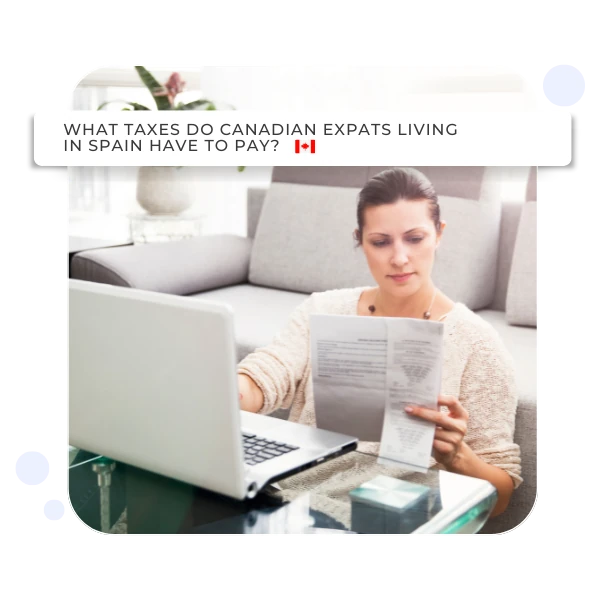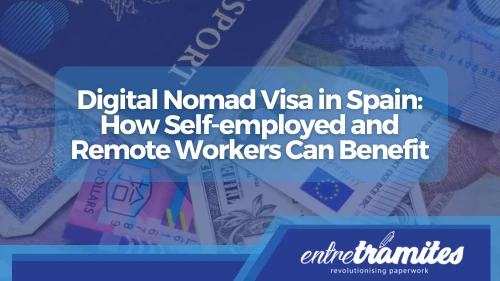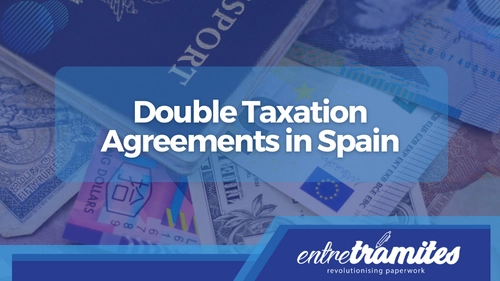Entre Trámites » Immigration Advice and Paperwork » Immigration Advice for Canadian Expats in Spain
Immigration advice for Canadian expats in Spain
Enjoy your new life! Moving to Spain from Canada
Make your Spanish residency journey stress-free! Our immigration consultations for Canadian citizens offer personalized guidance and essential tips. We provide you with expert advice, and our services ensure a seamless transition to life in Spain.
Moving to Spain from Canada
Dreaming of life in Spain? Whether you’re moving for the sunshine, lifestyle, remote work, retirement, or personal growth, this guide offers tailored advice for Canadians planning to relocate to Spain with clear, up-to-date information on visas, taxes, healthcare, and more!
Do I need a visa for Spain as a Canadian citizen?
As a Canadian citizen, you can travel to Spain for short stays of up to 90 days in every 180 days without needing a visa. But, if you plan to stay longer, you will have to apply for a residence permit.
If you permanently move to Spain and have resided there for more than 183 days in its fiscal year, you are generally considered a tax resident in Spain.

Basic requirements for most Spanish visas
- Completed visa application form, according to each visa.
- Valid passport (issued within 10 years, valid for 1+ year)
- 2 passport-sized photos
- Proof of accommodation in Spain (rental, property, or hotel booking)
- Criminal record check (RCMP, apostilled, and translated)
- Medical certificate (certifying no contagious diseases, translated)
-
Proof of financial means
- e.g., bank statements, employment contract, pension.
- Income requirements vary by visa type.
- Private health insurance (no co-pay, valid in Spain)
- Visa fee payment (~€80–€150, varies by consulate)
There are specific requirements for each visa type; these are the most general ones. Also, take into account that all foreign documents must be translated into Spanish and apostilled or legalized.
What are the main visa options for Canadians?
Non-Lucrative Visa
- Ideal for retirees or those living off savings or passive income.
- Cannot work locally or remotely.
- Requires proof of sufficient income: approx. €2,400/month plus €600/month per dependent.
- Renewable annually.
- Learn more about the Non-Lucrative Visa.
Digital Nomad Visa
- For remote workers and freelancers with non-Spanish clients.
- Requires income from outside Spain (minimum ~€2,650/month).
- Ideal for tech workers, consultants, or creatives.
- Includes tax incentives via the “Beckham Law”.
- Learn more about the Digital Nomad Visa.
Student Visa
- For full-time study in Spain.
- Can include part-time work rights.
- Family members can apply for accompanying visas.
- Learn more about the student visa.
Work Visa
- Requires a job offer from a Spanish employer.
- Employer must sponsor the application.
- Often harder to get due to labor market tests.
- Learn more about the work visa as an employee.
Taxes & agreements for Canadians in Spain
Common tax considerations:
Canadian pensions may be taxed in Spain depending on the type.
TFSA gains are not tax-free in Spain.
RRSPs and RRIFs may receive deferred treatment under certain conditions.
The “Beckham Law” offers a reduced tax rate (24%) for qualifying new residents.
Tax residency comes with reporting obligations, such as:
Modelo 100: Annual income tax return (Renta).
Modelo 720: Declaration of foreign assets over €50,000.
Spain-Canada Tax Agreement:
- Spain and Canada have a Double Taxation Agreement.
- It prevents Canadians from being taxed twice on income, pensions, and property.
- You must declare global income in Spain if you’re a tax resident (spending >183 days/year in Spain).

Healthcare in Spain: Key facts for Canadians
Visa requirement:
You need private Spanish health insurance (with no co-pays) to apply for most visas, as mentioned earlier.
Public healthcare access:
Available once you're:
- Employed/self-employed and contributing to Spanish social security, or
- Enrolled in the "Convenio Especial" or Special Agreement with Social Security after 1 year of residency.
Convenio Especial:
Voluntary public healthcare plan:
- €60/month (under 65) or €157/month (65+).
- Does not cover prescriptions.
High-quality public system:
Free or low-cost care once registered with your Tarjeta Sanitaria (Individual Health Card). Emergency care is available to all, but not free if you’re uninsured. Always arrive with insurance.
Do you still have questions about the immigration procedures you need to do in Spain? Talk to an expert here!
Schedule a consultation with an immigration expert
Here's what people say about us
Frequently asked questions
General info
Can I work remotely from Spain as a Canadian?
Yes, but you need the appropriate visa. The Digital Nomad Visa allows Canadians to live in Spain while working remotely for foreign employers or clients. You must meet income and insurance requirements and follow immigration rules to avoid legal issues.
How do I apply for Spanish residency after getting my visa?
Once in Spain, you must apply for residency by getting a NIE, registering your address (empadronamiento), and applying for your TIE card within 30 days. This process officially converts your visa into long-term residency status.
Can I bring my spouse and children with me on my visa?
Yes, most long-term visas allow family members to join as dependents. You’ll need to show a higher income to support them and complete separate applications for each. Once in Spain, they also go through the NIE and TIE process.
Does Spain tax my Canadian pension or RRSPs?
Yes. As a Spanish tax resident, your Canadian pensions and RRSP withdrawals are taxable in Spain.
The Canada–Spain tax treaty helps avoid double taxation, but Spain treats TFSA earnings as taxable.
Do I need to file taxes in Canada after moving to Spain?
If you’re still considered a Canadian tax resident, you must file and report global income.
If you become a non-resident, you only report Canadian-source income. Filing a departure return and severing ties helps confirm non-residency.
Payment
What is the price and payment method?
The price you see when you schedule your consultation in the calendar is the final price (including 21% VAT).
You can pay using a debit or credit card.
Our team
How do I contact the advisor handling my case?
Is there another way to contact Entre Trámites?
We want to listen to you and know what your doubts are or what you need in relation to our services. You can count on the advice of our experts to clarify all your doubts.
Write to us at [email protected] and we will contact you as soon as possible or, if you prefer, call us.





